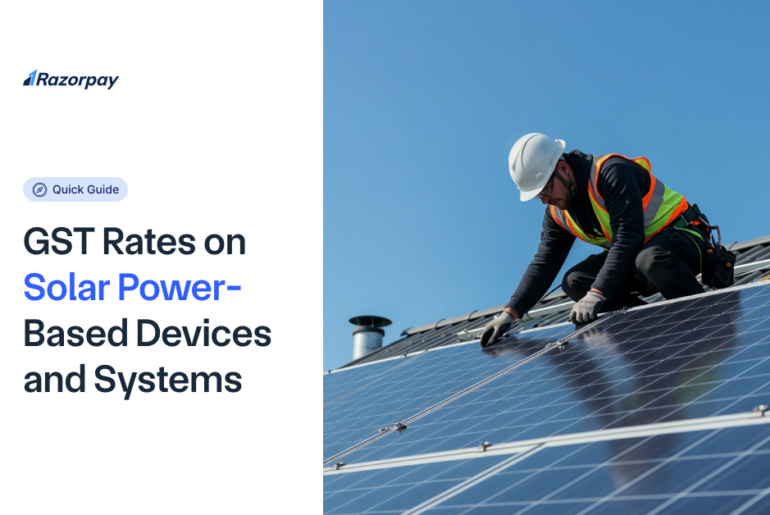Solar power is a rapidly growing industry in India, with the government promoting the sustainable growth of innovative solar projects. However, the introduction of the Goods and Services Tax (GST) has impacted the sector, including the GST rates applicable to solar power-based devices and systems. This article provides a comprehensive overview of the GST on solar power generation, GST Rates on Solar Panels, and related equipment.
Table of Contents
Definition and Scope of Solar Power-Based Devices and Systems
Solar power-based devices and systems encompass a wide range of products that harness sunlight to generate electricity. These include:
- Solar panels or modules
- Solar inverters
- Solar water heaters
- Solar lanterns and lamps
- Solar home lighting kits
- Solar power generating systems
- Solar rooftop installations
The solar panel HSN code falls under Chapter 85 of the GST tariff, which covers electrical machinery and equipment.
Applicability of GST on Electronics and Solar Power-Based Devices
The GST rates for solar power-based devices and systems have evolved since the introduction of the tax regime in July 2017. The current GST rate structure, effective from 1st October 2021, is as follows:
Product Category |
GST Rate |
|---|---|
|
Goods under Chapters 84, 85, 94 |
12% |
|
Composite supply (other than maintenance services) |
13.8% (70% of 12% + 30% of 18%) |
|
Composite supply (maintenance services or AMC) |
18% |
The GST on services related to solar power projects, such as installation and commissioning, attracts an 18% rate under the “Works Contract Services” category (SAC 9954).
GST exemption Available for Solar Power-Based Devices and Systems
Currently, there are no specific GST exemptions for renewable energy devices, including solar power-based equipment. All goods under Chapters 84, 85, and 94 of the GST tariff are charged at a 12% GST.
However, the government has provided some relief for solar EPCs through the 70-30 ratio for composite supply contracts. Under this provision, 70% of the contract value is considered as the supply of goods and taxed at 12%, while the remaining 30% is treated as services and taxed at 18%.
GST Rates and HSN or SAC Codes for Solar Power-Based Devices and Systems
Here is a table summarizing the GST rates and HSN/SAC codes for common solar power-based devices and systems:
Product |
HSN/SAC Code |
Standalone GST Rate |
|---|---|---|
|
Solar modules |
8541 | 12% |
|
Solar inverter with PV module |
8504 | 12% |
|
Solar water heater |
841919 | 12% |
|
Solar lantern, street light, home lighting kit, along with a PV module |
9405 | 12% |
|
Solar power generating system |
8504 | 12% |
|
Installation and commissioning services |
9954 | 18% |
It is important to note that ancillary components like mounting structures (18%), cables (18%), and batteries (28%) attract different GST rates.
Impact of GST on the Solar Industry
The implementation of the Goods and Services Tax (GST) on solar energy devices and systems is integral to India’s strategy for promoting renewable energy. By setting a moderate tax rate, the government aims to alleviate the initial financial burden on consumers and businesses, thereby fostering broader adoption of solar technologies. This approach aligns with India’s objectives to enhance its renewable energy capacity and reduce carbon emissions.
In the Union Budget 2024, Finance Minister Nirmala Sitharaman introduced several measures to bolster the solar energy sector:
Exempted Capital Goods:
The list of capital goods exempted from customs duties for manufacturing solar cells and panels has been expanded. However, exemptions for solar glass, regular glass, and thinned copper interconnects have been withdrawn, citing adequate domestic manufacturing capacity.
Support for Pumped Hydro Storage:
A new policy will be introduced to support pumped storage projects, aiming to provide a round-the-clock renewable energy supply and enhance energy stability.
Increased Financial Assistance for Rooftop Solar:
Financial aid under the rooftop solar programme has been increased. For systems up to 3 kW capacity, assistance has been raised to INR 18,000 per kW in general states. For systems over 3 kW and up to 10 kW, the support has been set at INR 9,000 per kW.
These initiatives underscore the government’s commitment to accelerating the adoption of renewable energy and making solar technology more accessible across the country.
Conclusion
In conclusion, the GST rates on solar power-based devices and systems have been streamlined under the current tax regime. While there are no outright GST exemptions, the 12% rate on most solar equipment and the 70-30 ratio for composite contracts have brought much-needed clarity to the sector. As India pursues its ambitious renewable energy targets, a stable and transparent tax structure will be crucial in promoting the sustainable growth of the solar power industry.
Frequently Asked Questions (FAQs):
1. How much GST is on a solar power generating system?
The GST rate on solar panels and power-generating systems is 12% when supplied as a composite unit. If the components are supplied and invoiced separately, they may be treated as a mixed supply and attract different GST rates.
2. How do you calculate GST on solar power generation?
For the composite supply of solar power generating systems, 12% GST is applicable on 70% of the contract value (goods), and 18% GST on the remaining 30% (services). Effectively, the total GST works out to 13.8%.
3. Are solar power projects eligible for GST exemption?
Currently, there is no specific GST exemption for solar power projects. All solar power-based devices and systems are taxed at a 12% rate under the GST regime.
4. How does GST impact the overall cost of solar installations?
The introduction of GST has marginally increased the cost of solar power projects compared to the pre-GST era. However, the rationalization of rates and the 70-30 ratio for composite contracts has helped mitigate the impact to some extent.


